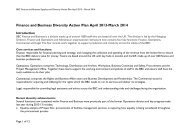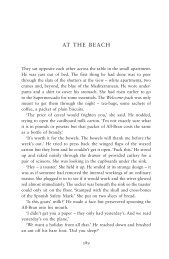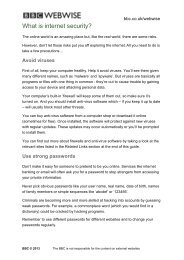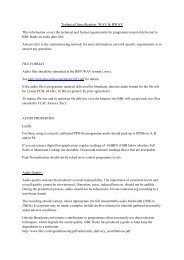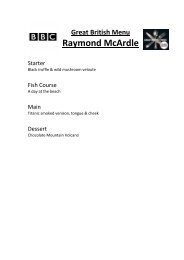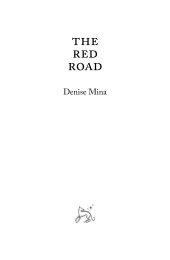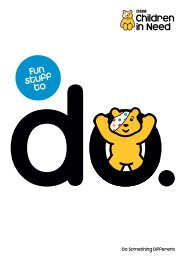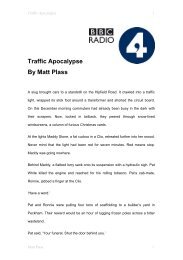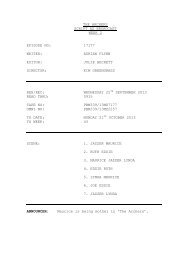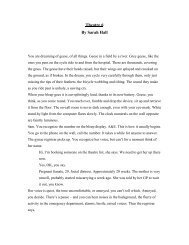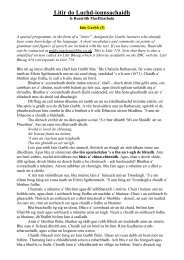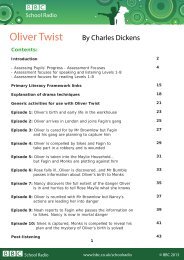Commissioning Brief - BBC
Commissioning Brief - BBC
Commissioning Brief - BBC
You also want an ePaper? Increase the reach of your titles
YUMPU automatically turns print PDFs into web optimized ePapers that Google loves.
<strong>Commissioning</strong> Details<br />
<strong>Commissioning</strong> Year 2014/2015<br />
Main (First) Round<br />
Ad Hoc <strong>Brief</strong>s<br />
Documentaries<br />
Presenter-Led Genre Series<br />
Ideas Welcome<br />
Round Opens 26/07/13<br />
Round Closes 12/09/13 @ noon<br />
Results Published 27/11/13<br />
1
CONTENTS<br />
Section 1: Network Introduction and Overview Page 3<br />
Section 2: Overview of Radio 2 Performance and Audience Page 5<br />
Section 3: Working with Radio 2 Page 7<br />
Section 4: Ad Hoc <strong>Brief</strong>s and slots available for commission Page 13<br />
Documentaries Page 13<br />
Presenter-Led Genre Series Page 17<br />
Ideas Welcome Page 20<br />
Section 6: <strong>Commissioning</strong> Contacts Page 23<br />
2
‣ Section 1: Network Introduction & Overview<br />
Welcome to our Main <strong>Commissioning</strong> Round for 2014/2015.<br />
It’s been another successful year for the network, still the biggest, and ‘most listened to’, radio<br />
station in the UK. In the latest RAJAR figures, we has moved up again to a record weekly reach<br />
of 15.27m. The average age of a Radio 2 listener remains stable at 51 years, as does the average<br />
age of a listener to our Breakfast Show. The Chris Evans Show posted a record reach and share,<br />
9.80m and 19.2%, and there were also record reach figures for programmes right across the<br />
schedule: Ken Bruce, Jeremy Vine, Graham Norton, Pick of the Pops, Dermot O’Leary, Steve<br />
Wright Love Songs, Weekend Wogan, Elaine Paige and Johnnie Walker.<br />
The last couple of months have seen Radio 2 broadcast some very creative and distinctive<br />
programming, with much of that content right at the heart of our daytime schedule. At the end<br />
of May Chris Evans introduced his 500 Words children’s writing competition with the Final again<br />
held at the Hay Literary Festival. This year we received a record 90, 271 entries, and worked<br />
again with <strong>BBC</strong> Learning this year creating a 500 words pack which was sent out to over 5,000<br />
schools.<br />
Our third 2 Day was themed around the 60th anniversary of Friday Night Is Music Night. From Chris<br />
Evans through to Simon Mayo, each show shone a spotlight on a different section of the<br />
orchestra. We received an overwhelmingly positive response from the audience, while the<br />
digital impact of 2 Day was huge. Each daytime show featured live inserts from Hackney Empire<br />
- all filmed, edited and turned around quickly to be shared as ‘catch up highlights’ on our<br />
website and on social media. The day culminated in a Friday Night Is Music Night gala concert<br />
from Hackney, streamed live on the <strong>BBC</strong> Red Button and the Radio 2 website. On the night there<br />
were 378,000 live Red button views, with this rising to 590,000 following a catch-up day the week<br />
after.<br />
Our year-long documentary series The People’s Songs - Stuart Maconie’s History of Modern Britain<br />
in 50 records - continues throughout 2013. This project launched on our website last August (a full<br />
five months before transmission), where our listeners were encouraged to contribute to this major<br />
project. Their memories and recollections are now part of this landmark show which<br />
commenced in January. The entire run is ‘series-stacked’ on the Radio 2 website, so listeners can<br />
go and listen back to every show so far, and there is also a special People’s Songs Gallery at the<br />
O2’s British Music Experience.<br />
In 2013 Radio 2’s commitment to live music has been supported by a monthly series of unique<br />
multi-platform live music events, with performances by world famous talent. On Thursday 16th<br />
May, Rod Stewart performed an In Concert at the <strong>BBC</strong> Radio Theatre. It was not just an evening<br />
concert but an event which ran throughout the whole day – a lucky listener won a pair of tickets<br />
in Chris Evans’ Breakfast Show; Rod then performed a couple of songs in his ‘Soundcheck’ live for<br />
Claudia Winkleman. Jo Whiley hosted an “Ask Rod” interview where she put listener questions to<br />
the singer streamed on the Radio 2 website, and Rod also popped in to chat to Simon Mayo on<br />
his Drivetime show. The evening concert was streamed live on the <strong>BBC</strong> Red Button and the Radio<br />
2 website. 570,000 people watched the Red button, which included 179,000 watching live on the<br />
night.<br />
3
The following day Radio 2 commemorated the 70th anniversary of the Dambusters Raid. Chris<br />
Evans broadcast his Breakfast show live from RAF Scampton in Lincolnshire, and then flew in one<br />
of the last remaining serviceable Lancaster Bombers to Biggin Hill in Kent, where Jeremy Vine was<br />
broadcasting his show from. The day culminated in a special Friday Night Is Music Night, live from<br />
Biggin Hill airport. Jeremy and Dermot O’Leary retold the story of the Dambusters Raid in a<br />
documentary-drama, with a musical soundtrack played by the <strong>BBC</strong> Concert Orchestra and the<br />
Central Band of the RAF.<br />
Our specialist music offering is key to our broad and distinctive schedule. Over the first May Bank<br />
Holiday we broadcast live from the Cheltenham Jazz Festival. Friday Night Is Music Night<br />
celebrated 70 years of jazz and blues legend Georgie Fame where he performed alongside a<br />
number of special guests. On the Bank Holiday Monday, we had a special concert from<br />
Madeleine Peyroux, while Jamie Cullum also featured highlights from the festival in his jazz show.<br />
We may no longer have a weekly slot for half-hour comedy commissions, but we recognise that<br />
comedy is still very important to Radio 2. We continue to support <strong>BBC</strong> Radio’s New Comedy<br />
Award, with its home on Radio 2 within Steve Wright In The Afternoon. Also this year we have<br />
teamed up with our colleagues at <strong>BBC</strong> Radio 4 Extra. Both networks have aired the launch of the<br />
competition, while 4 Extra will broadcast the regional heats, and Radio 2 the semi-finals and final<br />
in December.<br />
Incredibly all of this content – from the final of 500 Words to the launch of the New Comedy<br />
Award, from In Concert to Friday Night Is Music Night, from our documentary content to specialist<br />
music events – was broadcast in May this year!<br />
With continued pressures on budgets, we need to be cleverer with ad-hoc commissioning for<br />
Radio 2 – fewer, bigger, better – there will be fewer commissions, but we want to buy more<br />
ambitious programming that has a bigger and better cut-through, with impact right across our<br />
schedule, and across different digital platforms. And looking ahead to the period of this<br />
commissioning round – we have obviously already commissioned programming around The<br />
Guitar, The Commonwealth Games and World War I, so many of our available slot are already<br />
covered, but please feel free to suggest any complimentary ideas you may have on these, or for<br />
other themes and projects that you think may work well for Radio 2.<br />
But as always I would encourage you to talk to Robert about your proposals before you formally<br />
submit them. These Pre-Offers Meets will give you a steer on focus and content, and how your<br />
ideas might work within the context of the schedule. And please contact Julian with any<br />
questions you may have regarding the processes, commissioning or the schedule. And please<br />
feel free to feedback any ways in which we could improve the way we work with you.<br />
For the really big ideas you should think about the possibility of partnerships, inside and outside<br />
the <strong>BBC</strong>, and you should also be aware the <strong>BBC</strong> Learning are willing to help fund ideas that have<br />
educational angle to them.<br />
Thank you for continuing to engage with Radio 2.<br />
Bob Shennan<br />
Controller, <strong>BBC</strong> Radio 2, <strong>BBC</strong> Radio 6 Music & Asian Network<br />
4
‣ Section 2: Radio 2 Performance & Audience<br />
5
Kim McNally<br />
Research Manager, Radio 2, 6 Music, Radio 3, Popular & Classical Music genres<br />
6
‣ Section 3: Working with Radio 2<br />
This section contains information on;<br />
<br />
<br />
The <strong>Commissioning</strong> process<br />
Delivery requirements<br />
o Programme<br />
o Technical<br />
o Press & Publicity Interactive<br />
o Interactive<br />
Overview<br />
The broadcasting world is changing fast and our audiences want to find our programmes wherever they<br />
appear. To help them, we need to make sure programmes are delivered on time, to length and with the<br />
necessary associated information.<br />
As well as the wider changes, Radio 2 is playing out parts of the schedule automatically, removing live<br />
continuity announcements. This means the Radio 2 schedule needs to run exactly to time. To enable this,<br />
the scheduling team will be responsible for building the schedule in exact, hour long chunks. The changes<br />
required to help them do this are set out below<br />
Another benefit of hitting programme junctions accurately is no more problems with iPlayer clipping the<br />
ends of programmes.<br />
Delivery requirements …<br />
Pre-recorded programmes<br />
<br />
<br />
<br />
<br />
Programmes to be delivered 4 weeks prior to transmission<br />
Programmes to be delivered to exact durations – confirmed by Julian Grundy<br />
Programme descriptions to be provided 5 weeks prior to transmission<br />
Built trails to be exactly 45 seconds long<br />
Live programmes<br />
Programmes to be delivered to exact durations – confirmed by Julian Grundy<br />
Programme descriptions to be provided 5 weeks prior to transmission<br />
Built trails to be exactly 45 seconds long<br />
The Output<br />
Core Output of Radio 2<br />
The majority of programmes - the core output - are long-running strands which are produced either by<br />
Radio 2 producers or a small group of Independent companies. When the strands produced by<br />
Independents come up for renewal they are put out for tender using the process described below.<br />
Non - Core output of Radio 2<br />
<strong>Commissioning</strong> rounds take place twice a year to complement the core output. It is within these rounds<br />
that ideas are sought for a wide range of documentaries, specialist music, comedy, event and other<br />
programming. Readings are commissioned alongside special events or seasons.<br />
If you are an Independent Production Company, and want to enter offers to radio 2 commissioning<br />
rounds, please sign up to the <strong>BBC</strong> Radio Independent Production Company database using this Pro-<br />
Forma.<br />
7
The <strong>Commissioning</strong> Process:<br />
How will I know when to propose my idea?<br />
<br />
The Audio and Music Database will be used to alert Indies who have expressed an interest to all<br />
commissioning rounds using the <strong>BBC</strong> Radio <strong>Commissioning</strong> Website as well as email.<br />
<br />
In House producers will be notified that commissioning rounds are open via email.<br />
Submitting your proposal?<br />
We would encourage you to talk to the network – Robert Gallacher – about your proposals before<br />
you formally submit them. And, please contact Julian Grundy with any other questions you may<br />
have.<br />
Proposals are submitted using Proteus <strong>Commissioning</strong> (Proteus information web page).<br />
Proposals should include a short synopsis followed by a more detailed explanation of the idea and<br />
treatment being proposed together with a proposed price per episode. (More details on the site).<br />
Additional Information for Independent producers:<br />
To be considered for a commission, all Independent companies should ensure that their proposals<br />
demonstrate evidence of relevant experience for all staff involved in music-radio production within<br />
the briefs being tendered for.<br />
It is advisable to look at the Radio Business Affairs page of the <strong>BBC</strong> Radio <strong>Commissioning</strong> website<br />
before submitting a proposal. Full information useful to prospective programme-makers (including<br />
information on underlying Rights, contractual and legal aspects of commissioning, Health & Safety<br />
requirements and the <strong>BBC</strong>'s complaints procedure) are set out there.<br />
A summary of the terms agreed with the radio independent production sector is set out in the<br />
Terms of Trade. The programme production agreement that the <strong>BBC</strong> would expect to conclude<br />
with an independent producer is made up of the General Terms and the Special Terms.<br />
A guide to how you should deal with complaints from the public and how to direct your complaints<br />
to the <strong>BBC</strong> is available via the <strong>BBC</strong> Complaints Procedures for Independent Producers.<br />
What happens then?<br />
After the closing date there will be a shortlisting period where producers may be asked to discuss<br />
their idea further.<br />
Proposals will either be ‘conditionally commissioned’ at a suggested price or ‘rejected’. This<br />
information will be recorded in Proteus.<br />
All ‘conditionally commissioned’ proposals will state a provisional tx date. Please work towards the<br />
provisional tx date unless otherwise advised.<br />
All documentary / series presenters must be approved by the network prior to you contracting<br />
them, even if they have been discussed at a pitching meeting.<br />
Budget<br />
In-house budgets are agreed with Darren Bodek - <strong>BBC</strong> Finance Partner and the Radio 2<br />
<strong>Commissioning</strong> Team, and should be below or in line with the guide price listed in the<br />
<strong>Commissioning</strong> <strong>Brief</strong>.<br />
The budget Radio 2 is willing to pay for independent proposals is detailed at the time of<br />
conditional commission. If that offer is deemed unacceptable then a detailed budget will be<br />
required and negotiated with the Business Affairs team. The Business Affairs team support all of the<br />
<strong>BBC</strong>'s national radio stations in activities associated with contracting Independent productions.<br />
Formal Commission<br />
<br />
In House; your programmes are only formally commissioned when a presenter and budget have<br />
been agreed.<br />
Continued…<br />
8
Independent productions; your programmes are only formally commissioned when a presenter<br />
and budget have been agreed and a commissioning contract is signed and returned. Until this<br />
point, all commissions are still regarded as ‘conditional’ rather than 'formal commissions'. Any work<br />
you undertake prior to this is at your own risk.<br />
Please liaise with Darren Bodek and the Radio 2 <strong>Commissioning</strong> Team (<strong>BBC</strong>) or the Business Affairs<br />
Team (Independents) to ensure these are agreed ASAP.<br />
Compliance<br />
<br />
<br />
<br />
<br />
<br />
You must consult Fergus Dudley - Editor, Editorial Standards Radio 2, 6 Music & Asian Network over<br />
any Compliance issues you may have regarding language, rights or material BEFORE you make the<br />
programme.<br />
Compliance forms must also accurately reflect your programme content and conversations you<br />
have had with us.<br />
All programmes must comply with the relevant statutory and regulatory provisions. If you have a<br />
programme compliance issue and are not sure if it falls in the realms of editorial policy, programme<br />
legal advice, business affairs or elsewhere please contact Fergus Dudley.<br />
In line with the <strong>BBC</strong> Editorial Standards, compliance measures have been agreed and introduced<br />
for commissions across the <strong>BBC</strong>, including provisions relating to training and those occasions when<br />
on-air talent own or manage the company. Full details and guidance can be found on <strong>BBC</strong> -<br />
<strong>Commissioning</strong> - Compliance.<br />
All production staff working on commissions (producer & executive producer) must have<br />
completed the <strong>BBC</strong> 'Safeguarding Trust' course. If this is not the case please contact the network to<br />
organise the necessary training.<br />
Delivery requirements – Programme<br />
Delivery details will be available on all commissioning documentation and via the Radio commissioning<br />
website and, if you are an Independent Production Company, they will be included in your programme<br />
production agreement<br />
<br />
<br />
<br />
Pre-recorded programmes must be delivered to us 4 weeks prior to tx. For independent<br />
productions this is a contractual obligation.<br />
The network will designate some pre-recorded programmes as ‘Topical’ and the delivery date of<br />
those programmes will be set at a time different from 4 weeks ahead of TX<br />
Programmes which are normally live and have on occasions to be pre-recorded will agree their<br />
delivery date at the time the Scheduling team is informed of the change.<br />
Delivery 4 weeks out will allow us to better publicise your programmes, and enable us to meet the<br />
detailed compliance requirements. This will also assist Station Sound campaign planning. Please contact<br />
Chris Reay with the recording date with your presenter to help build a bespoke trail promoting your<br />
programme.<br />
<br />
<br />
All programmes must be delivered to the exact durations as advised (see commissioning briefs).<br />
These durations are not negotiable.<br />
Once delivered the programme duration will be checked by the scheduling team at the earliest<br />
opportunity - If the duration is incorrect, the producer of that programme will be informed by e-<br />
mail the duration is not acceptable and asked to deliver a version of the correct length by the<br />
following day.<br />
Failure to deliver to the terms and conditions of your programme commission with respect to timetabled<br />
dates and durations will be brought to the attention of Network management and could affect our ability<br />
to broadcast your programme.<br />
Should you be aware that you may have difficulty with any aspect of delivery you must inform the<br />
network – Julian Grundy - immediately.<br />
9
Delivery requirements – Programme Descriptions<br />
<br />
Programme descriptions must be provided 5 weeks prior to tx.<br />
In house producers must enter these in Proteus.<br />
Independent producers must use the template found via Programme Descriptions.<br />
This will provide our press and digital teams with the best possible opportunity to publicise your<br />
programmes, in an increasingly crowded market-place. (see Press and Publicity section)<br />
Delivery requirements - Technical<br />
Format<br />
Programmes must be delivered as a linear WAV, linear BWAV or FLAC file.<br />
<br />
<strong>BBC</strong> Radio technical specification for wav files can be found here:<br />
http://www.bbcradioresources.com/TechnicalSpecificationBWAV/index.html.<br />
For technical enquiries and expert advice email<br />
Pete Scott, Digital Specialist, Western House<br />
Andy Simmonds, Operations Manager, Western House<br />
Technical Delivery process<br />
Process for BWAV delivery – <strong>BBC</strong> Production departments<br />
You will need access to the "VCS Ingester" server. For details contact Pete Scott / Andy Simmonds<br />
<br />
<br />
<br />
<br />
<br />
From your digital editor bounce down the programme to a single 16 bit, 44.1kHz, stereo wav file.<br />
The naming of this wav file is important. It should include the Network, Title and TX date. It should<br />
not include any punctuation or spaces - use underscore to make the name readable. E.G.<br />
R2_A_Programme_120612.wav<br />
Save the programme BWAV to<br />
\\bbcmedrr006\vcs_ingester$\Radio_2\Radio_2_London_auto\R2_London_VCS_Programmes<br />
Make sure you have emailed the Pres details to Presentation-R2 (on the <strong>BBC</strong> Global Address list)<br />
cc’ing Julian Grundy, Paula Street, James Carpenter and Anna McMahon.<br />
In a few minutes, the wav file you saved will have changed to .ren. This means that the file has<br />
successfully transferred to Radio 2's VCS dira system.<br />
Contact the Radio 2 Presentation team via email (as above) or on 02 50655, 02 53112 or 02 53250<br />
to advise delivery. THIS IS CRUCIAL. They listen to the In and Out of the programme to check that<br />
they match the In and Out words on the presentation details and that the durations match. They<br />
also spot check the audio for obvious technical faults. If there are no problems, and the<br />
programme has received the required Proteus compliance sign-off, they will schedule it. The<br />
Presentation Office is staffed, Monday to Friday 1000 -1800.<br />
Failure to complete this step within 1 working day of delivering your programme can result in your<br />
programme being lost.<br />
10
Process for BWAV delivery – Independent Production Companies<br />
You will need an FTP account to access the <strong>BBC</strong>'s servers and you will need suitable FTP software. You<br />
may also require (free) FLAC encoding software. For details contact Pete Scott<br />
From your digital editor bounce down the programme to a single 16 bit, 44.1kHz, stereo wav file.<br />
<br />
The naming of this wav file is important. It should include the Network, Title and TX. It should not<br />
include any punctuation or spaces - use underscore to make the name readable. E.G.<br />
R2_A_Programme_120612.wav<br />
If required you may data compress the file to the FLAC format.<br />
Send the file to your company’s folder on the <strong>BBC</strong>’s FTP server.<br />
Make sure you have emailed the Presentation details to Presentation-R2 (on the <strong>BBC</strong> Global<br />
Address list) cc’ing Julian Grundy, Paula Street, James Carpenter and Anna McMahon.<br />
Contact the Radio 2 Presentation team via email (as above) or on 02 50655, 02 53112 or 02 53250<br />
to advise delivery. THIS IS CRUCIAL. They listen to the In and Out of the programme to check that<br />
they match the In and Out words on the presentation details and that the durations match. They<br />
also spot check the audio for obvious technical faults. If there are no problems, and the<br />
programme has received the required Proteus compliance sign-off, they will schedule it. The<br />
Presentation Office is staffed, Monday to Friday 1000 -1800.<br />
Failure to complete this step within 1 working day of delivering your programme can result in your<br />
programme being lost.<br />
Delivery requirements – Press & Publicity<br />
The Radio 2 Press and Publicity team generate publicity to inform new and existing audiences about what<br />
Radio 2 has to offer via print press, radio, television and online activity. There are a number of ways in<br />
which you can help give them the best chance of promoting you programme.<br />
<br />
<br />
<br />
When you deliver your programme description 5 weeks before transmission make them stand out.<br />
Great descriptions of the subject, location of interviews, pertinent quotes from contributors, and<br />
explanation of why the presenter is fronting the show all pique the interest of journalists and make<br />
the description searchable on the internet.<br />
Ask your presenter whether they are willing to promote the programme on radio, TV, online or in<br />
print. This could be an interview or an authored piece e.g. Stuart Maconie on The People’s songs<br />
The Daily Mirror - http://www.mirror.co.uk/lifestyle/going-out/music/great-brit-tunes-dj-stuartmaconie-1522141.<br />
If presenters aren’t able or willing to do it, we can sometimes use the insight<br />
from the producer e.g. for the <strong>BBC</strong> Radio blog: http://www.bbc.co.uk/blogs/radio/posts/Voice-<br />
Week-on-<strong>BBC</strong>-Radio-2<br />
Behind the scenes pictures or stories are useful if there is a major talent involved, or if the subject of<br />
the documentary is visually interesting.<br />
The earlier you deliver a pre-recorded programme the better. Most previewers look for<br />
programmes to feature approximately 3 weeks prior to transmission but if the network receives<br />
the programme earlier, we can target media as soon as possible. Monthly magazines i.e. GQ,<br />
Elle, Q, Mojo, work at least two months in advance.<br />
11
Delivery requirements – Interactive<br />
The Radio 2 audience is now engaging with digital in unprecedented numbers across online, mobile,<br />
tablet and the <strong>BBC</strong> Red Button. The launch of the <strong>BBC</strong> iplayer Radio app has resulted in the Radio 2<br />
audience listening via mobile and tablet in large numbers<br />
Audiences are consuming programmes through the website, via podcast and mobile in unprecedented<br />
numbers, The Peoples Songs series is the most listened to on demand documentary series to date. From<br />
January all <strong>BBC</strong> radio content will be available to download in full for 30 days via iplayer radio.<br />
Visualisation of our content has become especially important with most major Radio 2 events now in<br />
vision online and on red button where there are attracting record numbers. This is not just in popular<br />
music, heritage brands such as Friday Night is Music Night are reaching new listeners having been<br />
visualised for the first time. We will continue to look for new ways to reach an older audience digitally in<br />
the year ahead.<br />
The new Radio and Music Product which focuses around the promotion of audio and video as well as the<br />
live experience is enabling us to rapidly grow the online audience with a simpler experience for the user.<br />
We are, however, more reliant on programme teams updating pages and content. Additionally we are<br />
made a major push across social media, and ask all programmes to engage in this, updating the Radio 2<br />
Facebook pages and running their own twitter accounts.<br />
It is also important that everybody working for Radio 2 is aware of syndication opportunities for their<br />
content, where their material can live outside of the <strong>BBC</strong> online and in third party spaces. We will be<br />
looking for all programme makers to engage in this process, ensuring that their content has a life within<br />
digital spaces and grows organically online.<br />
In summary, all programme teams should be able to<br />
• Reversion their programme into a podcast and publish it<br />
• Be able to provide relevant metadata around their programming as requested<br />
• Be aware and communicate visualisation possibilities around their content.<br />
• Update their own social spaces as necessary<br />
• An awareness of music blogs and digital services and how they can be exploited<br />
• Ability and knowledge to segment content and make available online both inside and outside<br />
of the <strong>BBC</strong> environment.<br />
• Knowledge of the online audience and their requirements.<br />
• To plan content across the multiplatform space in addition to the linear environ.<br />
• Ability to publish online, update blogs and content listings.<br />
• Take, edit and publish good quality photographs of guests/artists on their programme<br />
We do recognise however that none of the above is a requirement under the current Terms of Trade for<br />
independent suppliers.<br />
12
‣ Section 4:<br />
‣ <strong>BBC</strong> Radio 2 <strong>Commissioning</strong> <strong>Brief</strong>s:<br />
‣ DOCUMENTARIES & MUSIC FEATURES<br />
Tx Slot Round <strong>Brief</strong><br />
No.<br />
Dur’n Available<br />
Slots<br />
Price<br />
Mon-Wed 1 20173 56’19” TBA TBA<br />
@ 22:03<br />
(Once Network budgets<br />
have been reviewed and<br />
approved – prices will be<br />
advised)<br />
<strong>Commissioning</strong><br />
Category<br />
Universal<br />
Radio 2’s documentary programming runs over consecutive nights on Mondays, Tuesdays and<br />
Thursdays. (Wednesday see the year-long The People’ Songs series aired, written and presented by<br />
Stuart Maconie).<br />
This brief is where Radio 2 continues to establish its credentials as a feature-maker of real merit and<br />
depth.<br />
We are looking to commission distinctive documentaries that reflect both the UK and the world.<br />
Celebrating the rich heritage of popular culture – music, entertainment and the arts – that the UK<br />
has created, exported and embraced. Currently, the slot is carrying documentaries that look back<br />
at British jazz saxophonist Benny Green’s life as a <strong>BBC</strong> Radio presenter, highlights from this years<br />
Latitude Festival – as covered by <strong>BBC</strong> 6 Music and, there’s another chance to hear Sir Tim Rice as<br />
he takes us on a musical journey around each of the states of the USA.<br />
Autumn sees the network embark upon a musical odyssey showcasing the best in blues and then<br />
country, in two themed seasons of programming, taking in such notable events as Bluesfest and the<br />
CMA Awards. Wrapping around these we have documentaries and music feature series fronted by<br />
amongst others Hugh Laurie and Cerys Matthews.<br />
We will also mark 1963 with special programming around the assassination of JFK, the TV birth of Dr<br />
Who and a remake of the satirical comedy series That Was The Week That Was with David Frost<br />
fronting That Was The Year That Was.<br />
You can see that from this snapshot of programmes (and the ones listed below), the scope is<br />
exceptionally broad. The strand demands strong journalism, creative, imaginative production,<br />
engaging, credible and passionate presenters and where possible, new interviews with key<br />
contributors. All of these elements make for compelling listening, whether introducing the<br />
audience to a subject, personality or theme for the first time or augmenting an existing knowledge<br />
or interest.<br />
As mentioned earlier in this document, we are looking to add distinctiveness to our daytime output<br />
by placing interviews from our documentary output into shows pre-7pm in order to provide a<br />
greater platform for your documentaries and provide an opportunity to put our evening content<br />
into context across the whole of Radio 2.<br />
Continued…<br />
13
‣ DOCUMENTARIES & MUSIC FEATURES continued<br />
Recent highlights have included…<br />
Music In The Air: History Of Music Radio<br />
Paul Gambaccini presented a six-part history of music radio in the UK and USA.<br />
His essays took in key themes such as…<br />
Broadcasting Has Come to Stay - The opening programme of the series revealed that the first<br />
piece of music ever played on radio was Handel's Largo - the aria Ombra Mai Fu from the opera<br />
Xerxes. Reginald Fessenden featured a recording of this music during a broadcast from the coast of<br />
Massachusetts on Christmas Eve 1906. And Paul traces the developments made by the early radio<br />
pioneers from this moment, to the end of the Second World War.<br />
The Moondog Kingdom - The second programme traced developments from the end of the<br />
Second World War, to the early 60s. The war had demonstrated the central role of radio in the lives<br />
of listeners. And in post-war America, large companies wished to remain part of that relationship<br />
with sponsored network shows.<br />
Good Night to You and Good Morning - The third programme traced the developments that led to<br />
the start of the <strong>BBC</strong>'s first dedicated channel for pop music - Radio 1 - in September 1967.<br />
God Bless You, Music Lovers - The fourth programme traced developments in the UK from the start<br />
of <strong>BBC</strong> Radio 1 in September 1967, to the late 1970s. In America, a new style of music presentation<br />
was heard on FM radio.<br />
It's All Happening at the Zoo - The fifth programme traced developments from the late 70s to the<br />
beginning of the 90s.<br />
It Always Brought Such Comfort - The final programme traced developments from the early 90s to<br />
the present day.<br />
Continued…<br />
14
‣ DOCUMENTARIES & MUSIC FEATURES continued<br />
Recent highlights have included…<br />
Electric Dreams: The Giorgio Moroder Story<br />
Nile Rodgers presented this special programme on Giorgio Moroder, the man behind the sound of<br />
Donna Summer, the producers' producer, the legend many say invented dance music.<br />
Nile focus' specifically on his work in music production, his formative years in Italy before he moved<br />
to Munich and how he created the team who would become known the world over as the Munich<br />
machine. This was at a time when Europe was really emerging as home to Krautrock - the name<br />
given to bands such as Kraftwerk, Can, Neu! and Tangerine Dream. Giorgio's sound though didn't<br />
fall under the 'Krautrock' umbrella. He was creating music which was fusing European electronica<br />
with American R n B. This was soon to be known as disco.<br />
Giorgio enjoyed massive success with Donna Summer, then with the Three Degrees and other artists<br />
including Sparks but it was his work in the film world that really sent him interstellar..<br />
In 1978 Alan Parker was directing a film called 'Midnight Express'. He really liked the sound of ' I Feel<br />
Love' by Donna Summer and promptly contacted Giorgio to do the soundtrack to the movie.<br />
Giorgio duly obliged - the film score went on to pick up an oscar and the rest as they say is history.<br />
Offers came fast and furious and there followed a mouth watering array of projects including<br />
American Gigolo, Top Gun, Flashdance, and lesser films such as Electric Dreams and the<br />
Neverending Story. Giorgio had conquered tinseltown. It was official.<br />
With fresh interviews with the man himself, Debbie Harry, Irene Cara, New Order's Bernard Sumner,<br />
and the Mael brothers from Sparks, among many more, Nile Rodgers celebrates the life and times<br />
of Mr Giorgio Moroder.<br />
Continued…<br />
15
‣ DOCUMENTARIES & MUSIC FEATURES continued<br />
Recent highlights have included…<br />
History Of British Comedy<br />
David Mitchell traced the history of British humour from Music Hall to the modern day. Stand up<br />
comedy, funny songs, blockbuster films, and superstar performers - it might seem like the world of<br />
today, but as David learnt, we've hardly travelled any distance at all.<br />
In the first of a four part series, David took us from 1913 to 1938. We learnt about the cutting edge<br />
innovation that was the Music Hall 'comedy turn'. And the programme also looked at the early days<br />
of the movies - silent at the start, but virtually entirely comedy based.<br />
Programme two traced the history of British humour from World War 2 to the dawn of the 1960s.<br />
From the cosy world of ITMA to the new wave represented by The Goons - here more than<br />
anywhere else, the path of modern British comedy changed.<br />
This episode looked at how the Variety Theatres were briefly closed - and then opened again to<br />
boost morale - and how Radio became a nation's lifeline.<br />
Programme three looked at 'Round The Horne' - Innuendo has been there in every programme so<br />
far, but never in the field of British comedy has anyone pushed as hard as Julian and Sandy did!<br />
He examined the big screen too. Everyone knows what is meant by the phrase "Carry On humour",<br />
but as the films moved through the 60s, they became freer and laced with sexual innuendo. But by<br />
their demise in the late seventies, the double entendre was more forced and attempts to shock<br />
were creeping in.<br />
Programme four traced the history of British humour from the 1980s to the present day.<br />
70s escapism gave way to 80s cynicism, and this final episode in the series explored why comedy<br />
changed suddenly instead of gradually - and the role Channel 4 played in that change.<br />
This was the era of The Young Ones and Blackadder, but was alternative comedy really something<br />
new - post World War 2 the old order was actively challenged by those seeking a new approach -<br />
and even before that, the Crazy Gang had almost set the template for 'alternative'?<br />
16
‣ Section 4:<br />
‣ <strong>BBC</strong> Radio 2 <strong>Commissioning</strong> <strong>Brief</strong>s:<br />
‣ PRESENTER-LED GENRE SERIES<br />
Tx Slot Round <strong>Brief</strong><br />
No.<br />
Duration<br />
Available<br />
Slots<br />
Price Guide<br />
TBA 1 20180 55’34” 50 weeks Up to £2k per<br />
programme<br />
<strong>Commissioning</strong><br />
Category<br />
Universal<br />
This is an hour-long slot that is looking to carry musical genres or presenter-led critiques of genres or<br />
elements of music making and their related expert musical exponents, that are not catered for<br />
directly, across the rest of the Radio 2 schedule.<br />
Genres across the strand could include reggae, rock’n’roll, latin, new wave, world, rock, gospel or<br />
classical. Please do suggest other genres that you feel have a place on the network and would<br />
appeal to our audience.<br />
The presenter is key. They must be a credible, trusted guide through the series. Illuminating their<br />
subject and contextualising in an informed, passionate manner.<br />
Nitin Sawhney<br />
Nitin Sawhney brought his eclecticism to Radio 2 in a series exploring music from all cultures and<br />
traditions 'in a welcome melting of all boundaries'. From flamenco to pop, rock to Indian classical,<br />
punk to electronica, reggae to drum 'n' bass, orchestral to folk, Nitin joins the dots between music<br />
and cultures around the globe. This show was truly a global sonic excursion blending the popular<br />
with the obscure and the innovative with the diverse.<br />
Plus each week Nitin collaborated with an artist to create a brand new track exclusively for the<br />
show. Collaborations for the series were with; London based 'One Eskimo' - renowned Malian Ngoni<br />
player Bassekou Kouyate who was also joined by his wife Amy Sacko on vocals – Japanese-born<br />
British violinist Diana Yukawa - Joss Stone.<br />
Continued…<br />
17
‣ PRESENTER-LED GENRE SERIES continued<br />
Nitin Sawhney<br />
Over the four part series we heard music from amongst others - soul legend Terry Callier, Pakistan’s<br />
Abida Parveen;, Chet Baker, dub producer LV, Astrud Gilberto, Bristol's Massive Attack, Spain's<br />
Tomatito, Turkey's Omar Faruk, Germany's Jazzanova and Afrobeat ensemble Kokolo Afrobeat<br />
Orchestra.<br />
Barry Manilow<br />
Barry Manilow returned to Radio 2 for a second ten-part series – this time Barry celebrated the lives<br />
and works of the great songwriters.<br />
Across the ten weeks, Barry brought his unique insight and presentation to profile songwriters that<br />
have shaped the direction of, and set the bar in, music composition.<br />
Barry’s profiles celebrated the work of the Jerome Kern - Cole Porter, the wealthy playboy who<br />
wrote wonderful music - the prolific yet little-known American composer Harry Warren - two<br />
extraordinary songwriters … Howard Dietz and Arthur Schwartz - a musical colossus who wrote an<br />
unimaginable number of hit songs over a 40 year period with numerous composers and did it<br />
without any formal musical training… Johnny Mercer - Alan Jay Lerner and Frederick Loewe, two<br />
legendary writers of musical theatre whose work includes Camelot, Brigadoon and My Fair Lady -<br />
the man with 23 Oscar nominations, Sammy Cahn - British songwriters Leslie Bricusse and Anthony<br />
Newley - Burt Bacharach and Hal David - Holland, Dozier and Holland, one of the greatest pop<br />
songwriting teams of all time.<br />
Continued…<br />
18
‣ PRESENTER-LED GENRE SERIES continued<br />
David Rodigan<br />
David Rodigan showcases his love for all types of reggae music. With classic roots and reggae from<br />
the 60s to the present, he celebrates its back catalogue and looks to its future.<br />
David is a hero to Jamaican music lovers here in the UK and right across the world. With his unique<br />
style and love for the genre, Rodigan has been at the top of his game for over 30 years. He has a<br />
massive following and is recognised as the authority in reggae broadcasting. There is no reggae<br />
artist Rodigan hasn't interviewed and his contacts in Jamaica and across the world are<br />
unbeatable. David is currently on air with his third series on the network.<br />
19
‣ Section 4:<br />
‣ <strong>BBC</strong> Radio 2 <strong>Commissioning</strong> <strong>Brief</strong>s:<br />
‣ IDEAS WELCOME<br />
Tx Slot Round <strong>Brief</strong> Dur’n Available Price Guide <strong>Commissioning</strong><br />
No.<br />
Slots<br />
Category<br />
TBA 1 20158 TBA TBA TBA Universal<br />
This is a brief designed to allow for ideas that carry an ambition that works beyond the traditional<br />
commissioning brief format. Where ideas do not naturally fit into commissioning briefs, or where<br />
ideas are outside of the traditional schedule, please propose them under this banner.<br />
This category is designed to give more opportunity for innovative ideas, special events and seasons<br />
to flourish. The seasons have worked extremely well, adding impact and range throughout the<br />
schedule, encompassing slots across comedy, documentaries, weekday and weekend output.<br />
Examples of ideas that have been offered and commissioned are;<br />
The People’s Songs<br />
Featuring memories contributed by Radio 2 listeners, Stuart Maconie narrates the story of post-war<br />
Britain via 50 records that soundtracked this dramatic and kaleidoscopic period.<br />
The People’s Songs is a weekly series that started in January 2013 on <strong>BBC</strong> Radio 2.<br />
Across 50 episodes, Stuart Maconie will present the epic story of how modern Britain was fashioned<br />
and shaped, as told by the music, stories and memories of this nation’s people.<br />
From “We'll Meet Again” to “Ghost Town”, from “Rehab” to “God Save The Queen”, we’ll tell the<br />
story of modern Britain via the records that sound-tracked the times - a period of conflict, social<br />
change, parties, prosperity, plenty, poverty, peace and war.<br />
This is a people's history; these are The People's Songs; the audience can help us make history!<br />
Memories, photos, comments, and song suggestions from the listeners help shape each<br />
programme.<br />
Continued…<br />
20
‣ IDEAS WELCOME continued<br />
The Listener’s Archive<br />
On Thursday 11 October 2012 a number of <strong>BBC</strong> buildings around the UK opened their doors and<br />
encouraged people to bring tapes, cassettes and recordings of <strong>BBC</strong> programmes they’ve found in<br />
their attics, under their stairs or in their garages - in the hope that they help build The Listeners’<br />
Archive.<br />
The major initiative was part of the <strong>BBC</strong>’s 90th anniversary celebrations and aimed to recover the<br />
lost gems of the <strong>BBC</strong>’s archive of radio programmes from 1936 to 2000. It was a pan-<strong>BBC</strong> Radio<br />
project involving <strong>BBC</strong> local radio in England, <strong>BBC</strong> Wales, <strong>BBC</strong> Northern Ireland, along with <strong>BBC</strong><br />
Radio 2, <strong>BBC</strong> Radio 4 and 4 Extra, <strong>BBC</strong> Radio 5 live and <strong>BBC</strong> Radio 6 Music.<br />
The recordings helped to enrich the <strong>BBC</strong>’s archive and plug the gaps in broadcasting history for<br />
future generations. The material collected was broadcast in special programming hosted by Simon<br />
Mayo and Steve Lamacq on Radio 2.<br />
The team were looking for a number of key programmes – including music sessions by high profile<br />
guests pre-1990, comedy programmes pre-1990, dramas and readings pre-1990, appearances by<br />
Dylan Thomas, a number of Reith lectures and lots more.<br />
21
‣ IDEAS WELCOME continued<br />
The Dambuster’s – 70 Years On<br />
Friday 17 May 2013 saw Radio 2 commemorate the 70th anniversary of the Dambusters raid with a<br />
day of special shows.<br />
Thursday 16 and Friday 17 May 2013 marked the 70th anniversary of the Dambusters Raid - an<br />
operation which changed the course of the Second World War. Nineteen Lancaster Bombers, each<br />
carrying the 'Bouncing Bomb', took off from Lincolnshire to destroy the dams of the Ruhr Valley at<br />
the heart of Germany's war-machine.<br />
The crews came from Britain, Australia, New Zealand and Canada. Eight aircraft didn't return. In<br />
total, 133 airmen took part in the raid, 53 of them died. In Germany almost 2000 lives were lost as a<br />
result of the dams being breached.<br />
Chris Evans stated the day off, broadcasting live from RAF Scampton in Lincolnshire, exploring Wing<br />
Commander Guy Gibson's base and meeting the people who could explain the science and<br />
history behind Operation Chastise, more commonly known as the Dambuster raids. Later in the day,<br />
on Jeremy Vine's show, Chris recalled his flight from RAF Scampton to Biggin Hill on board a<br />
Lancaster Bomber earlier in the day.<br />
From midday the Jeremy Vine show was live at ex-RAF airport Biggin Hill in Kent, discussing the<br />
legacy of the Dambusters. He discussed the mission, the impact it had, and looked at the future of<br />
the RAF and what it takes to become a pilot and we heard from the last surviving veterans from the<br />
original mission.<br />
From 8pm, Dermot O'Leary and Jeremy Vine presented a special Friday Night is Music Night<br />
commemorating the 70th anniversary of the Dambusters Raid.<br />
The iconic story was re-told with music from the <strong>BBC</strong> Concert Orchestra and the Central Band of the<br />
RAF, live at Biggin Hill Airport. The evening also featured drama and special messages from<br />
veterans and Barnes Wallis' daughter.<br />
22
‣ Section 5:<br />
Contacts<br />
The following list of contacts will be able to assist you at all points of the commissioning process…<br />
<strong>Commissioning</strong> & Scheduling<br />
Bob Shennan Controller 020 7765 4462<br />
Lewis Carnie Head of Programmes 020 7765 5219<br />
Robert Gallacher Editor, <strong>Commissioning</strong> 020 7765 2415 robert.gallacher@bbc.co.uk<br />
Julian Grundy<br />
Paula Street<br />
Anna McMahon<br />
James Carpenter<br />
Manager, <strong>Commissioning</strong> & Scheduling<br />
020 7765 3250 julian.grundy@bbc.co.uk<br />
Presentation, <strong>Commissioning</strong> & Scheduling<br />
020 7765 0655 paula.street@bbc.co.uk<br />
Programme Numbers, <strong>Commissioning</strong> & Scheduling<br />
020 7765 3112 anna.mcmahon@bbc.co.uk<br />
Programme Descriptions, <strong>Commissioning</strong> & Scheduling<br />
020 7765 2072 james.carpenter@bbc.co.uk<br />
Compliance<br />
Fergus Dudley Editor, Editorial Standards 020 7765 0938 fergus.dudley @bbc.co.uk<br />
Music, Interactive and Press & Publicity<br />
Jeff Smith Head of Music 020 7765 3433 Jeff.Smith@bbc.co.uk<br />
Brett Spencer Interactive Editor 020 7765 4710 brett.spencer@bbc.co.uk<br />
Ali Cowe Head of Communications 0207 765 5712 ali.cowe@bbc.co.uk<br />
Finance<br />
Michael Davis<br />
Darren Bodek<br />
Head of Finance, <strong>BBC</strong> Radio Business Affairs<br />
020 7765 3649 michael.davis@bbc.co.uk<br />
Finance Partner, <strong>BBC</strong> Core Finance<br />
020 7765 389 darren.bodek@bbc.co.uk<br />
23




